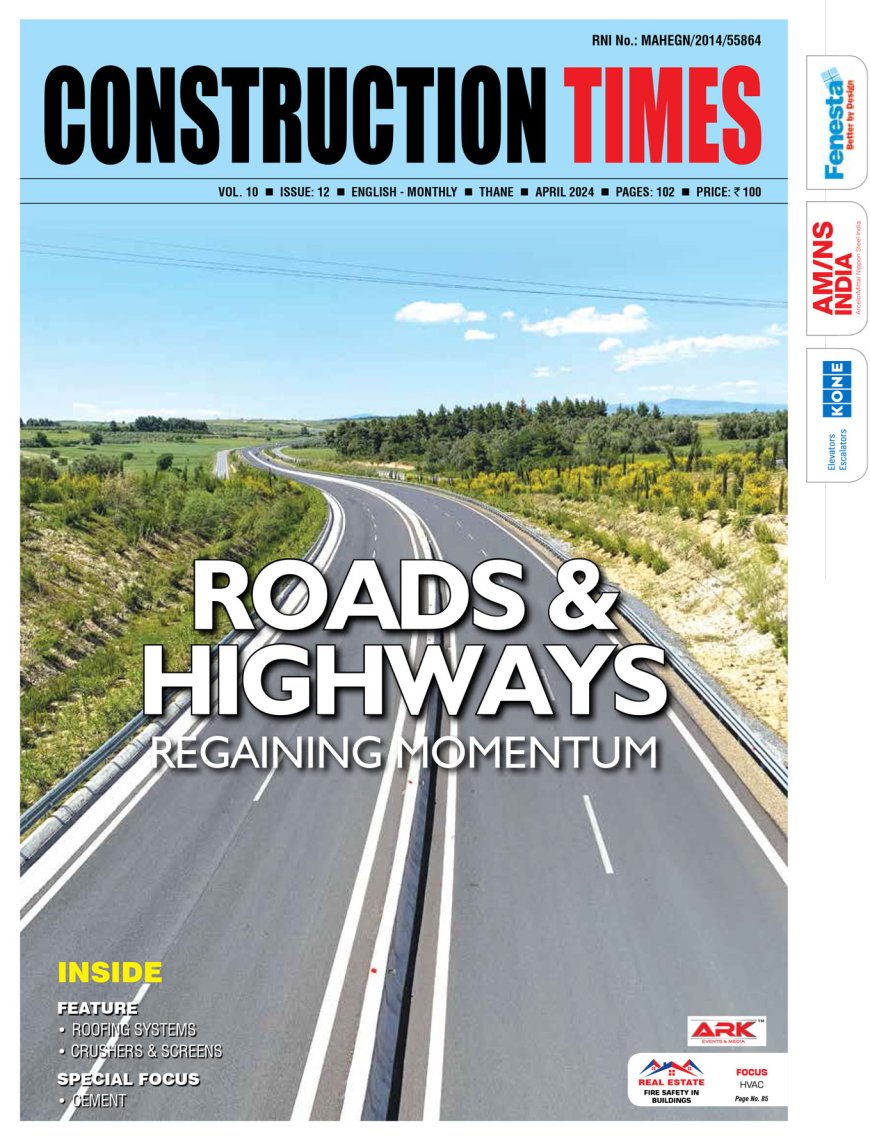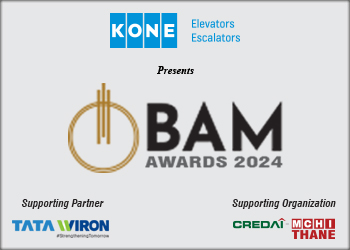A stepping stone for Real Estate
Dr. Niranjan Hiranandani, Founder and CMD, Hiranandani Group. “The need for single window clearance with integration module is crucial for the industry's performance,” states Dr. Niranjan Hiranandani, Founder and CMD, Hiranandani Group. In an exclusive interview with Construction Times he shares his views on current 'Single Window Clearance' scenario and why there is delay to


Dr. Niranjan Hiranandani,
Founder and CMD,
Hiranandani Group.
“The need for single window clearance with integration module is crucial for the industry's performance,” states Dr. Niranjan Hiranandani, Founder and CMD, Hiranandani Group. In an exclusive interview with Construction Times he shares his views on current 'Single Window Clearance' scenario and why there is delay to onboard 'Single Window Clearance'. In addition, he also explains on how the unique bill called 'The Right to Services Act takes charge if the project projects are not completed on time. He also highlights about role and importance of RERA and Ease of Doing Business.
What is the current progress of 'Single Window Clearance' and by when it is expected to be implemented?
Dr. Niranjan Hiranandani: In real estate, most of the permissions and clearances required for a real estate project are from the state government and the local self-body that is Municipal Corporation. The remaining are from central government agencies. So, a single window clearance system would need to have data and applications to all three authorities being submitted in a format that would be received and processed by each of the three authorities. The 'Ease of Doing Business' initiative has reduced the number of applications as also the number of days taken to process the same. India has also improved its rating as regards construction permission processes, according to the World Bank's Ease of Doing Business report. So, things are moving in the right direction. (Here we are saying that rating has improved in construction permission and in question no 6 its reverse).With the introduction of reformation ACT like RERA, enabling the compliance mechanism of the sector in place; it is expected that speedy approvals and clearances will be imperative to adhere to abide the rule framework. This revolutionary step will accelerate things to move in the right direction and we expect the same to move from 'good 'to' better and from 'better' to 'best' - in the due course.
 Why do you think there is a delay in fulfilling the demand for 'Single Window Clearance'? Please explain.
Why do you think there is a delay in fulfilling the demand for 'Single Window Clearance'? Please explain.
Dr. Niranjan Hiranandani: With the involvement of multiple agencies in process of clearing applications to sanction due approvals for any of the real estate projects at state, local and central government level is a time consuming system. Also, these system are driven with 'human interface' which now the government has realised the dearth to replace it with digital programming method. Now, with the shift in focus inclined towards the digitisation of approvals will reduce the discrepancies, time lag and expedite the process flow. The need for single window clearance with integration module is crucial for the industry's performance.
Although, we are moving into the right direction, with online approvals and responses granted under RERA Act, there is need to fasten up the process.
Is the real estate sector facing downturn? How.
Dr. Niranjan Hiranandani: 2016 and 2017 were years when the economy went through a perceived slow-down, given the transformational changes in regulatory framework of the nation pertaining the real estate sector. This resulted in many home seekers turning into 'fence sitters', while real estate developers too adopted a 'wait and watch' policy. Now that the new regulatory regime is in place, and things are back to normal - albeit, under the new norms - we are seeing a return to normalcy. The impact of slowdown has now started showing the recovery signal, though it might take sometime to fully recover. Now with the environment conducive for the fence sitters to make a right choice of buying their dream homes, they are turning into the actual end users showing the market recovery move.
How 'Single Window Clearance' can significantly help developers to focus on their core business of project execution?
Dr. Niranjan Hiranandani: This is simple logic - it will save time, which in turn will help save on interest cost of project finance. Earlier the clearance, earlier the completion; and effectively, at a lesser cost, calculating interest costs of project finance. In a lighter vein, if clearances become time bound and through a single window, it will free human resources from 'consultancy' and 'interaction ensuring proper system being followed vis-à-vis departments/officials - and real estate developers will be able to devote more time and resources to actual work on ground to achieve the deliverables.
As of now what initiatives have been taken by the government to create a conducive business environment for the developers?
Ease of doing business is among the leading initiatives. The Indian government currently has systematically worked at reducing numbers of permissions and clearances, and the industry hopes they will do the needful within a short span of time.
What action is RERA taking on major real estate markets that are running behind schedule?
Dr. Niranjan Hiranandani: The 'Ease of Doing Business' in terms of structure is the most important thing because if one creates wrong structure then the problem is always complicated. A structure requires multiple permissions which create multiplicity problems hence the number of permission needs to be mitigated. The World Bank also rated our country low down to approximately 150 the year before last. The reason why the rating went down was that the World Bank recorded 'Ease of Doing Business' in terms of the real estate segment was really a matter of concern both in Mumbai and Delhi (its in ref to the approvals issue). By leaning on this issue, the Indian government took an immediate note of it and mandated simplification in the methodology and the structure that is required to be changed. To note, Mumbai Municipal Corporation, Thane Municipal Corporation and Delhi have made lots of changes for the purpose of simplifying and 'Ease of Doing Business'. One of the principle things they followed is Mumbai Corporation requires all the submission of municipal client online only. In part of it they have also streamlined the payments systems in one place. And the third issue for the purpose of catering the permissions for completion of project within timeline, the government has laid down certain guidelines on how to complete the projects within timeline but there are chances that some may not follow the guideline so for them the Government of Maharashtra has come up with a very unique bill called 'The Right to Services Act'. It mandates that every individual is treated at par as consumer and the duty is cast upon the officers to provide this as a service so that there is pressure to penalise automatically which will push the developer to complete projects in the certain timeframe that they are required to perform as per the deadline approved by the government. So this combination will bring a better situation in terms of operation at the grass roots level.
There are strict guidelines in real estate bill against the developers who do not complete projects on time? Do you think that always the developers are at fault or “single window clearance” is a major culprit?
Dr. Niranjan Hiranandani: This has been one of the major issues flagged of by NAREDCO when the law was passed under RERA. We raised this issue that in many cases it is beyond the power of the builders to really do it and there are genuine reasons wherein delays take place which are not beyond our control but this is something which is the regulatory authorities will have to take it into consideration. However, what has happened is reality, as few developers have really not performed well in the last couple of years due to various challenges and due to which every developer is painted negative as if they are intentionally causing the delays and non-deliverables. With the 'Ease of Doing Business' mechanism under the Act of RERA, new projects will need to have all the mandatory approvals for the market launches vis-à-vis earlier pre sales used to happen without required approvals in place. This automatically brings in the required transparency and streamlines the irregularities. Also, the escrow mechanism under RERA binds the developer to develop the respective project against which the fund has been collected negating the scope of misusing of the funds. Hence, the government has undertaken the corrective measures to clear discrepancies in the running of the sector which acts a win-win situation for all the stakeholders are it consumers, developers, government and the nodal agencies.
In what ways do you think “single window clearance” will help RERA?
Dr. Niranjan Hiranandani: Of course! Without each other the whole exercise of the subject is lost. What is RERA asking you to do is the timely completion of the projects and 'Ease of Doing Business 'model will act as an enabler to achieve the same objectives.
How important is it for RERA and real estate industry to have single window clearance? What is your main objective in your tenure?
To accomplish an ambitious objective of the Prime Minister, Narendra Modi to provide 'Housing for All' by 2022 can be achieved with the quintessential transformation in the Indian Real Estate sector. To achieve the goal, government has needs to take imperative decision and policy reforms to augment the sectorial performance in the better way. With the introduction of RERA ACT and establishing Single window clearance, the government is extending all the support to achieve the ambitious target of Housing for All by 2022. NAREDCO has partnered with the Mumbai Grahak Sangh to safeguard consumer's interest and joined hands with MAHA RERA conciliation committees wherein those people who are applying under MAHARERA for complaints can approach us for out of the court conciliation instead judicial appeal. Within seven days of the appeal, the matter will be resolved by the MAHA RERA conciliation committee.
We have shortage of skilled labour in India. As an association what initiatives are you taking to overcome this issue?
Dr. Niranjan Hiranandani: This year we are skilling 4,000 people overall and which will be completed by March this year. This is a complete CSR activity. They all will be absorbed and employed in the various sectors along with the construction. Certification will also be provided and we are doing it in collaboration with the state HR Ministry. To improve the quality of workmanship and deliver better output we try to skill unskilled labours to provide perennial employment in the country.
Can you throw some light on the safety factors as well as the waste generated by the industry?
Dr. Niranjan Hiranandani: On the safety factors if you go to any of our township project sites, we strictly follow three important things. Firstly, we have a mandate to train the work force on the site to follow the safety rules and abide the laws. Safety measures like wearing helmets, safety nets around the buildings; safety signage's are strictly imbibed and followed as a protocol for the onsite workers. This definitely reduces the calamities on the site, though one cannot mitigate it fully.
Hiranandani Townships were smart cities since its inception 25 years back with Hiranandani Gardens, Powai and upgraded at the newer developments. Recycling of waste water at water treatment plant, dry and wet waste segregation at Bio-degradable plant to produce methane gas, Solid waste management, rain water harvesting was primarily part of our well-planned township to maintain the ecological balance. Afforestation and Horticulture are imperative at our township to retain the green reserve for eco -green environment. As part of an association, we recommend and encourage other developers to adopt same eco-friendly measures in their respective developments as part of civic infrastructure.
There are many changes in the technology, the automation is taking over, and there is sustainable green approach. What is your take on this?
Dr. Niranjan Hiranandani: There are two aspects to it. Digitisation and technology leapfrogs are inevitable in the current economy. As an industry, we need to gear up and adapt ourselves with innovative technology to enhance the output with speedy delivery and upgrade the quality. With the growing economy, development in the real estate and construction sector is also increasing day by day in terms of volume. To cater such high volume of production, we need empower construction team with the best innovative technology like Aluminum shuttering, use of tower cranes for material lifting, automation, Myron technology etc. This digitisation requires training the unskilled work force to skilled and optimising their performance.
Has the demand for the green products have increased in the real estate sector?
Dr. Niranjan Hiranandani: Yes awareness and demand for sustainable green products has been on rise. We have built LEED gold and platinum rated buildings in Hiranandani Gardens, Powai and Hiranandani Estate, Thane. We have built India's first International Financial Service Centre (IFSC) which is a GOLD LEED rating green building. Hence, we believe in the green building concept.
What is your take budget?
Dr. Niranjan Hiranandani: When he started his Budget Speech, Finance Minister Arun Jaitley said what has been largely expected that the budget will focus on Agriculture and rural economy. He did not disappoint, with what has largely turned out to be a 'Socialist' budget, one that is good for the economy - but somehow seems to have missed out on the positives that focus on real estate would have brought. Housing for India's poor did not miss the Finance Minister's focus, during the speech he focused on the Prime Minister Awas Yojana (PMAY), under which, the scheme- rural will see 51 lakh houses in the year 2017-18 and 51 lakh houses during 2018-19 being constructed exclusively in rural areas. In urban areas, the assistance has been sanctioned to construct 37 lakh houses. In a nutshell, Finance Minister Arun Jaitley has managed to balance populist demands, the need to support economic growth and Prime Minister Narendra Modi’s focus on fiscal discipline and reforms, but somehow seems to have largely missed out on real estate.
Demonetisation, Benami Properties Act, RERA, and GST - having laid the foundation for a more transparent and organized real estate through 2016-17, I had expected the Finance Minister to look at real estate as a GDP multiplier as also a job creator. Obviously, it would also be about being a means of providing the home seeker with an affordable home. We expected consolidation of taxation rates, enabling single window clearance and according industry status to real estate. All missed out. The one 'hit' - housing for the poor under PMAY.
From a real estate perspective, the Finance Minister in his Budget Speech said the government will establish a dedicated affordable housing fund in the National Housing Bank through various funding measures. This is a welcome step.
The Finance Minister mentioned 'reducing hardships faced in realty deals' - this is a 'positive'. In his Budget Speech, the Finance Minister mentioned the 5 percent differential to be allowed from ready reckoner rate. This will benefit buyers in the current market scenario, but if deferential goes above 5 percent, it can get tricky - no real estate developer will be able to reduce price-point beyond 5 percent.
It was also positive to see Suburban Railways in Mumbai and Bengaluru find a mention in the budget. Improved railway network and accessibility generally have a positive multiplier effect on real estate.
Hits: 41












